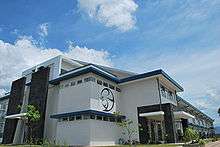Bandung Alliance Intercultural School
Bandung Alliance Intercultural School (BAIS) is in Kota Baru Parahyangan, a development on the outskirts of Bandung, Indonesia. As a member of the Network of International Christian Schools since 1995, BAIS is a private, non-profit school primarily serving the international community of Bandung. BAIS offers an education based on the international philosophy of education from a Christian perspective for students from pre-school through grade 12. Graduates of BAIS are prepared for entry into English-speaking universities.
History
In 1956 the Christian Missionary Alliance (CMA) started the Bandung Alliance International School (BAIS) in the Ciumblueit area of Bandung. It was designed to serve up to 80 students, grades 1–6, in a one-story classroom building. The number of students increased and the school added a second floor to the building. The extra space added room for secondary classes, increased space in the office building, and added a sports field.
The Network of International Christian Schools (NICS) took over management of the school in 1995 and the first graduating senior class was in 2001. To cope with increasing numbers BAIS purchased a 3.5-hectare lot in Kota Baru Parahyangan in 2007, a new development on the outskirts of Bandung.

Construction on the classroom/office building was completed in July 2008 with classes starting in August for the 2008–2009 school year. During the 2015–2016 school year, the student body was able to begin use for the full sized soccer field and swimming pool. There are plans to start the office building, auditorium, and indoor gymnasium.
It has an enrollment of 175 students preschool 3-12th grade.
Facilities
There is a large classroom building, two computer labs, one multi-purpose room, one music room, library, and office space. In 2016, the school completed construction of a full sized soccer field and a swimming pool.
External links
- Bandung Alliance Intercultural School
- Kota Baru Parahyangan
- Network of International Christian Schools